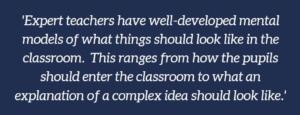In the last two newsletters we looked at the Deliberate Practice Coaching Model at Work and Line Management. Now we turn our attention to mentoring and what we mean when we describe someone as a mentor.
The role of mentor is one which can be easily assigned to staff, yet we must question whether it is fully understood and if indeed the title needs to be redefined as our understanding of leadership grows. As Paul Hammond suggested in the December newsletter, mentoring is now seen as a more ‘directed and deliberate style of coaching’.
The introduction of the Early Career Framework and the clearly defined (and funded) role of the mentors has clarified its function in the context of those new to teaching. Such a structured and defined approach to the role of mentoring has, I believe, helped in developing the expertise of the mentors and improved the way in which ECTs learn to become teachers. The ECF recognises that:

In the past, there have been some challenges for these mentors without a clear structure through which to communicate what they know effectively. I have heard a fair few heads and senior leaders talk of brilliant teachers who struggle to break down their approaches to those who are less experienced. It is not just about seeing what good practice looks like but understanding how and why it works.
Therefore, taking on the role of mentor in the ECF has meant learning new approaches for many, even those with significant mentoring experience. For heads and senior leaders, it offers and opportunity to develop a deeper understanding of their teams and consider how they support the development of others. It remains to be seen how this will unfold as we embed the ECF and the impact on staff development but is certainly one to watch.
What we are sure we want is for mentors to be experts in their field. We all want to learn from those at the top of their game, who are successful because of the impact their work has in their chosen field. We like to ask them about their ‘journey’ and unpick what actions they took to achieve such amazing results. In schools, we look to heads who have achieved strong outcomes for all students; whose leadership teams are skilled and knowledgeable; and where staff and pupils all learn and grow.
As a new head teacher, I was assigned an experienced head teacher as my mentor. I didn’t know her (and she didn’t know me) and more crucially, neither of us had a clear understanding of what being a mentor/mentee involved. There was not much of a dialogue between us as a result. However, when asked, she provided practical support such as job descriptions/policies and answers to mostly practical questions. And there is absolutely a place for that, particularly when faced with challenges that you have no experience in (and we’ve all been there) but my mentoring support didn’t go much further than that.
So, before we even think of assigning mentors (except for ECTs), we need to define the role. This will be specific to the context but in principle we are asking for experts to share their expertise in order to develop others. Developing others to become experts is more than just answering questions when they ask.
It may be helpful for mentors to think of how they can move their mentees along the continuum of consultant (you’re the expert, you give answers), collaborator (thinking together) to coach (solution focused, finding the answer within them using questioning). Mentees will need different things at different times. The core aim of a mentor is to support your mentee to be independent, confident and take ownership, thereby developing their own initiative and motivation to solve the problem.
As a school I would suggest beginning by exploring your understanding of the mentor’s role before developing that into an agreed, shared understanding that forms the basis of the mentoring contract. Using the experience of ECT mentors could be a good place to start.
